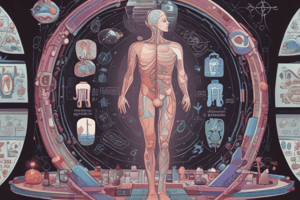Podcast
Questions and Answers
Which medication is a type of Phosphodiesterase-5 inhibitor?
Which medication is a type of Phosphodiesterase-5 inhibitor?
- Sildenafil (correct)
- Albuterol
- Salmeterol
- Tiotropium
Which of the following medications is a type of Anticholinergic?
Which of the following medications is a type of Anticholinergic?
- Montelukast
- Ipratropium (correct)
- Formoterol
- Prednisone
Which medication is a type of Beta-2 adrenergic agonist?
Which medication is a type of Beta-2 adrenergic agonist?
- Enoxaparin
- Digoxin
- Albuterol (correct)
- Isosorbide dinitrate
Which of the following medications is a type of Anticoagulant?
Which of the following medications is a type of Anticoagulant?
Which medication is a type of Calcium channel blocker?
Which medication is a type of Calcium channel blocker?
Which of the following medications is a type of Nitrates?
Which of the following medications is a type of Nitrates?
Which of the following insulin types has the shortest duration of action?
Which of the following insulin types has the shortest duration of action?
What is the mechanism of action of Biguanides in treating type 2 diabetes?
What is the mechanism of action of Biguanides in treating type 2 diabetes?
Which of the following medications is a GLP-1 agonist/incretin mimetic?
Which of the following medications is a GLP-1 agonist/incretin mimetic?
What is the primary indication for the use of ACE-Is?
What is the primary indication for the use of ACE-Is?
Which of the following diuretic types is contraindicated in patients with acute kidney injury?
Which of the following diuretic types is contraindicated in patients with acute kidney injury?
What is the mechanism of action of HMG-CoA reductase inhibitors in treating hyperlipidemia?
What is the mechanism of action of HMG-CoA reductase inhibitors in treating hyperlipidemia?
Which of the following medications is a centrally acting alpha 2 agonist?
Which of the following medications is a centrally acting alpha 2 agonist?
What is the primary indication for the use of Fibrates?
What is the primary indication for the use of Fibrates?
Flashcards are hidden until you start studying
Study Notes
Endocrine
- Rapid-acting insulin types: insulin lispro, insulin aspart, insulin glulisine
- Short-acting insulin type: regular insulin
- Intermediate duration insulin type: NPH insulin
- Long-acting insulin types: insulin glargine (U-100), insulin detemir
- Biguanide type: metformin
- Sulfonylureas: glyburide, glipizide
- Meglitinides: repaglinide, nateglinide
- Thiazolidinediones: rosiglitazone, pioglitazone
- DPP-4 inhibitors: sitagliptin
- SGLT-2 inhibitors: empagliflozin
- GLP-1 agonists/incretin mimetics: semaglutide
Cardio I
- ACE-Is: lisinopril, captopril
- ARBs: valsartan, losartan
- ARNIs: sacubitril-valsartan
- Loop diuretics: furosemide, bumetanide
- Thiazide diuretics: hydrochlorothiazide, chlorthalidone
- Potassium-sparing diuretic: spironolactone
- Osmotic diuretic: mannitol
- Cardiac glycoside: digoxin
- Calcium channel blockers: diltiazem, verapamil, amlodipine, nifedipine
- HMG-CoA reductase inhibitors: atorvastatin, rosuvastatin, simvastatin
- Amiodarone
- Alpha-adrenergic blocker: terazosin
- Beta blockers: propranolol
- Centrally acting alpha 2 agonist: clonidine
- Nitrates: nitroglycerin, isosorbide dinitrate, isosorbide mononitrate
- Hydralazine
- Bile sequestrants: colesevelam
- Ezetimibe
- Fibrates: gemfibrozil
Cardio II/Respiratory
- Sodium channel blockers: procainamide, quinidine
- Beta blockers: propranolol, metoprolol, carvedilol
- Potassium blocker: amiodarone
- Calcium channel blockers: verapamil, diltiazem
- Atropine
- Digoxin
- Adenosine
- Anticoagulants: heparin, enoxaparin, warfarin, direct oral anticoagulants (dabigatran, rivaroxaban, apixaban)
- Antiplatelets: aspirin, clopidogrel, ticagrelor
- Thrombolytics: alteplase (tPA)
- Nitrates: isosorbide dinitrate, isosorbide mononitrate, nitroglycerin
- Phosphodiesterase-5 inhibitors: sildenafil, tadalafil
- Beta-2 adrenergic agonists: albuterol, formoterol, salmeterol, terbutaline
- Methylxanthines: theophylline, aminophylline
- Anticholinergics: ipratropium, tiotropium
- Beta agonist/cholinergic antagonist combinations: albuterol/ipratropium
- Glucocorticoids: beclomethasone, fluticasone, prednisone
- Leukotriene receptor agonists: montelukast
Studying That Suits You
Use AI to generate personalized quizzes and flashcards to suit your learning preferences.




